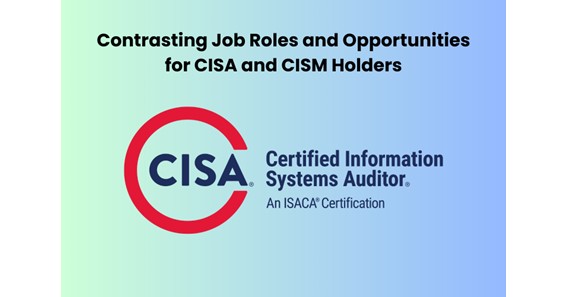The Certified Information Systems Auditor (CISA) and the Certified Information Security Manager (CISM) are two prestigious certifications offered by ISACA (Information Systems Audit and Control Association) that are highly valued in the field of information security and audit. While both CISM and CISA Certification are recognized globally and demonstrate expertise in information systems and security, they are designed for different career paths and job roles. In this blog, we will contrast the job roles and opportunities for CISA vs CISM holders, providing insights into how these certifications can shape your career in the field of information security and audit.
Understanding the CISA Certification
Professionals who audit, regulate, monitor, and evaluate an organization’s business and information technology systems are intended for the CISA certification. The concepts and procedures of governance, risk management, auditing, and information security management are all well-known among CISA holders. They have the tools to recognize and resolve hazards and vulnerabilities in an organization’s IT infrastructure while maintaining compliance with legal standards and industry best practices.
Job Roles and Opportunities for CISA Holders:
Information Systems Auditors: CISA holders often perform the role of information systems auditors, assessing the efficacy of an organization’s information systems procedures and controls. They conduct audits to evaluate information systems’ availability, security, and integrity and pinpoint areas needing development.
IT Compliance Manager: CISA holders may also perform positions involving IT compliance, making sure that the IT procedures and practices of a company adhere to applicable rules, laws, and guidelines. They may conduct internal audits to evaluate adherence to these standards and develop and implement policies and processes to guarantee compliance.
IT Risk Manager: CISA holders who emphasize identifying, evaluating, and managing risks associated with an organization’s IT operations and infrastructure may choose to specialize in IT risk management. They create risk management frameworks and techniques to lessen the effect of any risks and weaknesses.
IT Consultant: CISA holders may operate as IT consultants, offering businesses professional counsel and direction on enhancing their IT governance, risk management, and compliance procedures. They could also help deploy IT procedures and controls to improve efficiency and security.
Understanding the CISM Certification
Professionals who manage, create, supervise, and evaluate an enterprise’s information security are intended to use the CISM certification. Holders of a CISM certification are adept in creating and overseeing an organization’s information security programme, coordinating it with business objectives, and ensuring it effectively safeguards the company’s information assets.
Job Roles and Opportunities for CISM Holders:
Information Security Manager: CISM holders often occupy positions in developing, implementing, and managing an organization’s information security programme. They supervise the creation and application of security controls, policies, and procedures to safeguard the company’s information assets.
Security Consultant: CISM holders may work as security consultants, offering their knowledge and counsel to businesses on creating and implementing efficient information security plans. Additionally, they could evaluate the security posture that an organization currently has and suggest changes to strengthen security.
Chief Information Security Officer (CISO): CISM holders are qualified for positions in senior leadership that include overseeing an organization’s whole security posture such as Chief Information Security Officer (CISO). They oversee security budgets, create and implement security plans, and guarantee regulatory compliance.
Risk Manager: CISM holders may also have positions in risk management, where their primary responsibility is to detect and reduce information security-related hazards. They create risk management frameworks and tactics to address security risks and weaknesses.
Contrasting Job Roles and Opportunities
Although they serve distinct career paths and employment duties, the CISA and CISM certifications are beneficial in information security and audit. Professionals who want to specialize in auditing and compliance responsibilities may find the CISA certification useful since it emphasizes auditing and evaluating an organization’s information systems and controls. On the other hand, the CISM certification is focused on information security management. It is perfect for those who want to work in leadership positions in information security, such as security managers or CISOs.
Conclusion
There are unique career routes and prospects in information security and auditing for those with the CISA and CISM certifications. You may choose the certification that best fits your dreams and gives you the skills and information needed to succeed in your chosen job path based on your interests and career goals. Both credentials provide a strong basis for a fulfilling career in the exciting fields of information security and audit, whether you want to specialize in information security management with the CISM certification or auditing with the CISA certification.



